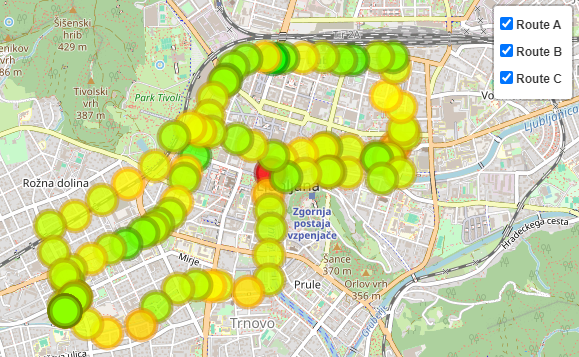Science on Two Wheels – Celebrating the 20th Anniversary of IPS
Published: 04. sep. 2024
The promotional cycling event, organized on 3 September 2024, by the International Postgraduate School as the final celebration of its 20th anniversary, saw participation from students, faculty, and staff. They cycled from IPS on Jamova cesta 39 to the final destination at Rog Center. Equipped with low-cost particle sensors, they rode along three pre-determined routes, identified as the cleanest, the most polluted, or the most pleasant. Data was collected following protocols from the Urbanome citizen science project, highlighting the importance of thoughtful route selection for daily cycling.
At the destination, in front of Rog Center—a symbolic location for civic laboratories—the participants discussed their experiences, the cycling infrastructure, urban stressors, and the possibilities offered by new sensor technologies and ICT solutions. The event also emphasized the active involvement of the broader public in research projects.
The main goal of this initiative was to encourage reflection on the various aspects and impacts of urban mobility. The event symbolized the key directions of IPS, which strives towards environmentally friendly technologies and a cleaner environment. It also highlighted the integration and connection of all four study programs: Ecotechnology (environmental pollution measurement), Nanotechnology (sensor materials), Sensor Technologies (devices and sensing concepts), and Information and Communication Technologies (IoT, low-cost devices, data integration).
Participants used a portable, user-friendly device equipped with sensors to detect air pollutant concentrations. The device took measurements every minute, with data wirelessly transmitted to a local server and displayed in a user-friendly format. The participants also discussed the pros and cons of such low-cost devices. Interpretations of the results showed trends and minor differences along the routes, which were relatively small due to generally low particle concentrations and good air circulation.
According to Dr. David Kocman from the Department of Environmental Sciences at IJS, preliminary results indicated that exposure conditions varied not only between different cycling routes but also between individual days and even within a single day. Performing measurements at the individual level allows for a precise insight into these changes, better understanding of their causes, and consequently, daily adjustments in choosing the optimal route. This way, cyclists can more effectively adapt to current conditions and select the most suitable route for the day. As part of data collection for the Urbanome project, nearly 60 people had participated by the end of July 2024, as stated by Dr. Rok Novak, a collaborator on the project. The motivation for IPS students to participate is primarily linked to their studies and research work.
Prof. Dr. Milena Horvat, Dean of IPS, mentioned that the promotional cycling event reflects the interdisciplinary nature of studies at the Jožef Stefan International Postgraduate School, where theory intertwines with practical research, especially in the field of ecotechnology. Additionally, the event provides students with the opportunity to socialize and strengthen mutual ties, which is extremely valuable in today’s increasingly isolated work environment. In this way, it promotes not only professional but also social development, which is crucial for successful research work.
About the Urbanome Project: Urbanome is one of the many European projects (Horizon Europe) in which IPS postgraduate students participate. The project focuses on researching the impact of urban stressors on people's health and well-being. One of the pilot cities is Ljubljana, where cyclists’ exposure to polluted air on their daily routes is studied. Volunteers participating in the project actively collect data using environmental sensors, following the principles of citizen science. A developed data visualization platform provides insight into individual exposure, and volunteers can explore differences within a single day, between different days of the week, and especially differences in exposure when using alternative, "greener" routes they choose themselves. The data is expected to not only provide individual-level insights but also support the planning of green cycling routes and the improvement of cycling infrastructure in Ljubljana.
Cycling and walking to work are part of a healthy daily routine, but appropriate measures are needed to protect cyclists from air pollution. Due to their proximity to motor traffic, cyclists and pedestrians in urban environments are more exposed to pollution, which can harm their health. Therefore, it is important to conduct measurements at the individual level, as each person knows their environment, lifestyle, and exposure factors best.
In the first phase of the project, which lasted from April to July 2024, around 60 volunteers participated, completing more than 1,000 routes and providing over 20,000 minutes of measurements. Researchers are continuously publishing preliminary findings in the monthly newsletter of the urban laboratory, which is available on their website, where you can also subscribe: http://www.environment.si/en/projects/urbanome/
The second phase of the project begins in September, providing another opportunity to participate. All urban cyclists in Ljubljana who are interested in participating can express their interest by emailing urbanome@ijs.si.
About IPS: The Jožef Stefan International Postgraduate School responds to the challenges of modern times with its study program. The four study programs offer theoretical knowledge and research experience at partner research organizations such as the Jožef Stefan Institute, the National Institute of Chemistry, the National Institute of Biology, and various economic organizations. To date, 530 students have completed their doctorates and 117 have completed their master's degrees at the school. The school is internationally recognized and collaborates with 30 universities worldwide. It is also highly attractive to foreign students, who make up about a third of all students. So far, 140 international students have completed their studies.
Contact:
Prof. Milena Horvat, Dean of MPŠ (milena.horvat@ijs.si)
Dr. David Kocman (david.kocman@ijs.si)
Dr. Rok Novak (rok.novak@ijs.si)

Measured concentrations of PM2.5 particulate matter while cycling from IPS to Rog Center along three different routes. The color indicates the measured concentration on a specific section of the cycling path (green-red: 11 µg/m³ - 16.5 µg/m³; for context, according to ARSO data, the average annual PM2.5 level in Ljubljana in 2023 was 13 µg/m³).
Back to all news

